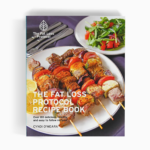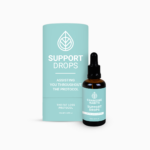A British study published in the journalEnvironmental Health Perspectives has found that people with high levels of perfluorooctanoic acid (PFOA) in their blood also have higher rates of thyroid disease. PFOA is a chemical used in the production of many industrial and consumer products including non-stick cookware, stain-resistant carpet coatings, and fabric waterproofing treatments. This is why we should glass, stainless steel and crockery only.
Cyndi O’Meara
Scientists have linked a chemical used in consumer goods like non-stick pans and water-resistant fabrics with thyroid disease, raising questions about the potential health risks of exposure to the substance.
A study by British researchers found that people with high levels of the chemical perfluorooctanoic acid (PFOA) in their blood have higher rates of thyroid diseases — conditions which affect the body’s metabolism.
PFOA is a common chemical, used in industrial and consumer products including non-stick cooking pans, stain-proof carpet coatings and waterproofing for fabrics.
The study, published in the Environmental Health Perspectives journal, did not establish whether PFOA was causing higher levels of thyroid disease.
The researchers said the link might be complex and indirect, and added that their work highlighted a need for further studies of the human health effects of low-level exposures to chemicals like PFOA.
“We need to know what they (these chemicals) are doing,” said Tamara Galloway, a professor of ecotoxicology at Exeter University, who led the research.
Previous studies of people living near sites where PFOA is manufactured have not found an association between exposure to these chemicals and thyroid function, and some other scientists advised caution about drawing conclusions from the study.
“Studies like this cannot tell us that the two things are definitely linked,” said Ashley Grossman, professor of neuroendocrinology at Queen Mary, University of London.
“We also don’t know whether this chemical is directly affecting the thyroid. Thyroid disease is often caused by the body’s own immune system attacking the thyroid gland so perhaps this chemical is having some effect on the immune system, rather than directly on the thyroid.”
The thyroid, located in the neck, is a kind of master gland, secreting hormones affecting metabolism. People with low thyroid function may lose hair, gain weight and feel sluggish, while those with overactive thyroids may lose weight and feel their hearts race. Both conditions can be treated.
The British researchers looked at 3966 American adults aged 20 and above whose blood serum was sampled between 1999 and 2006 for PFOA. They found that those with the highest PFOA concentrations (above 5.7 nanograms per milliliter) were more than twice as likely to report current thyroid disease than individuals with the lowest levels (below 4.0ng/ml).
Thyroid diseases are much more common in women than men, but in terms of the link between PFOA and thyroid disease, the researchers found no difference between the sexes.
Galloway and colleagues stressed the need for more work but said their study suggested it is “plausible that the compounds could disrupt binding of thyroid hormones in the blood or alter their metabolism in the liver.”
“This new evidence does not rule out the possibility that having thyroid disease changes the way the body handles PFOA,” they added, and its presence “might also prove to be simply a marker for some other factor associated with thyroid disease.”
(Editing by Tim Pearce)
Source: Kate Kelland in Reuters, Jan 21 2010, http://www.reuters.com/article/idUSTRE60K0PP20100121







0 Comments